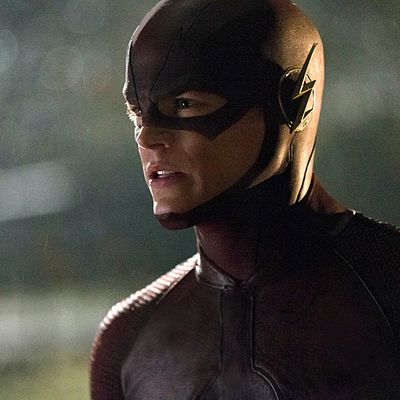
Dark and gritty may have revolutionized superhero movies, or at least expanded their dramatic palette, but thereÔÇÖs something primally appealing about the sight of an earnest, uncomplicated hero instinctively doing whatÔÇÖs right.
The CWÔÇÖs new series┬áThe Flash┬áhas that sort of hero at its center: Barry Allen (Grant Gustin), a young man whoÔÇÖs caught in an experiment gone horribly wrong and finds himself capable of superhuman speed. Well, thatÔÇÖs not exactly right: ItÔÇÖs more that Barry has the ability to defy the laws of Newtonian physics and operate on fast-forward when everyone else is working at a regular rate. (The pilot throws around quantum physics, dark matter, and other terms, but ultimately theyÔÇÖre just elaborate ways of saying:┬áDude can run.)
Emotionally wounded since childhood by his fatherÔÇÖs wrongful imprisonment for killing his mom (a death actually caused by the same freak cosmic disturbance that later gave him superhuman powers), Barry is a reluctant superhero in the Spider-Man wheelhouse. HeÔÇÖs a nice guy who awakens from a coma and finds himself being poked and prodded and measured by young/cute scientists Caitlin Snow (Danielle Panabaker) and Cisco Ramon (Carlos Valdes), and studied by their boss, Dr. Harrison Wells (EdÔÇÖs Tom Cavanagh), the super-genius responsible for the experiment gone awry. Of course this world contains supervillains (seemingly human fallout from the same mishap that created the Flash), a mentor (BarryÔÇÖs surrogate dad Detective Joe West, played by Law & Order alum Jesse L. Martin), and a potential love interest (Candice PattonÔÇÖs Iris) whoÔÇÖs slotted into the Intrepid Female Partner spot for the time being. And the show is apparently part of a wider TV universe shared with the CWÔÇÖs other DC Comics adaptation,┬áArrow (both series are overseen by the same showrunner, Greg Berlanti). In fact, itÔÇÖs fair to say that there isnÔÇÖt a single element in The Flash that you havenÔÇÖt seen before. It should all be a big yawn.
And yet itÔÇÖs not. The earnestness puts it over. Pilot director David Nutter (an X-Files veteran) and screenwriters Berlanti, Andrew Kriesberg, and Geoff Johns (all of whom have been involved with Arrow) are smart enough to know that if youÔÇÖre trying to breathe life into something as primordially cornball as this, the best strategy is to act as if nobodyÔÇÖs seen it before, and the filmmakers and actors are discovering the material for the first time.
The gambit works. The dialogue is often purely functional and sometimes so choked with exposition that it feels as though somebody meant to swap it out for better material later but didnÔÇÖt, and of course the CGI soup of lighting and smoke and blurry fistfighters and chasm-jumpers is very 2014 multiplex. (The one exception is a tornado that has a bit of the old Wizard of Oz menace.) At first, the sight of all these contemporary actors pretending like theyÔÇÖre in a black-and-white serial from 1955 seems too studied, but after a few minutes you get used to it, and soon itÔÇÖs charming. Gustin has a Christopher Reeve quality; you instinctively root for him and believe every syllable he utters, no matter how syrupy or Pollyanna-optimistic. The rest of the cast is on his wavelength, tapping into the spirit of the enterprise. The repudiation of the modern superhero filmÔÇÖs default baselines of darkness and ÔÇ£gritÔÇØ isnÔÇÖt the point, surely ÔÇö or at least not the only point ÔÇö but it comes here nonetheless. Modest and sweet, itÔÇÖs the perfect companion to Arrow. Its theme music could be ÔÇ£(WhatÔÇÖs So Funny ÔÇÿBout) Peace, Love, and Understanding.ÔÇØ


